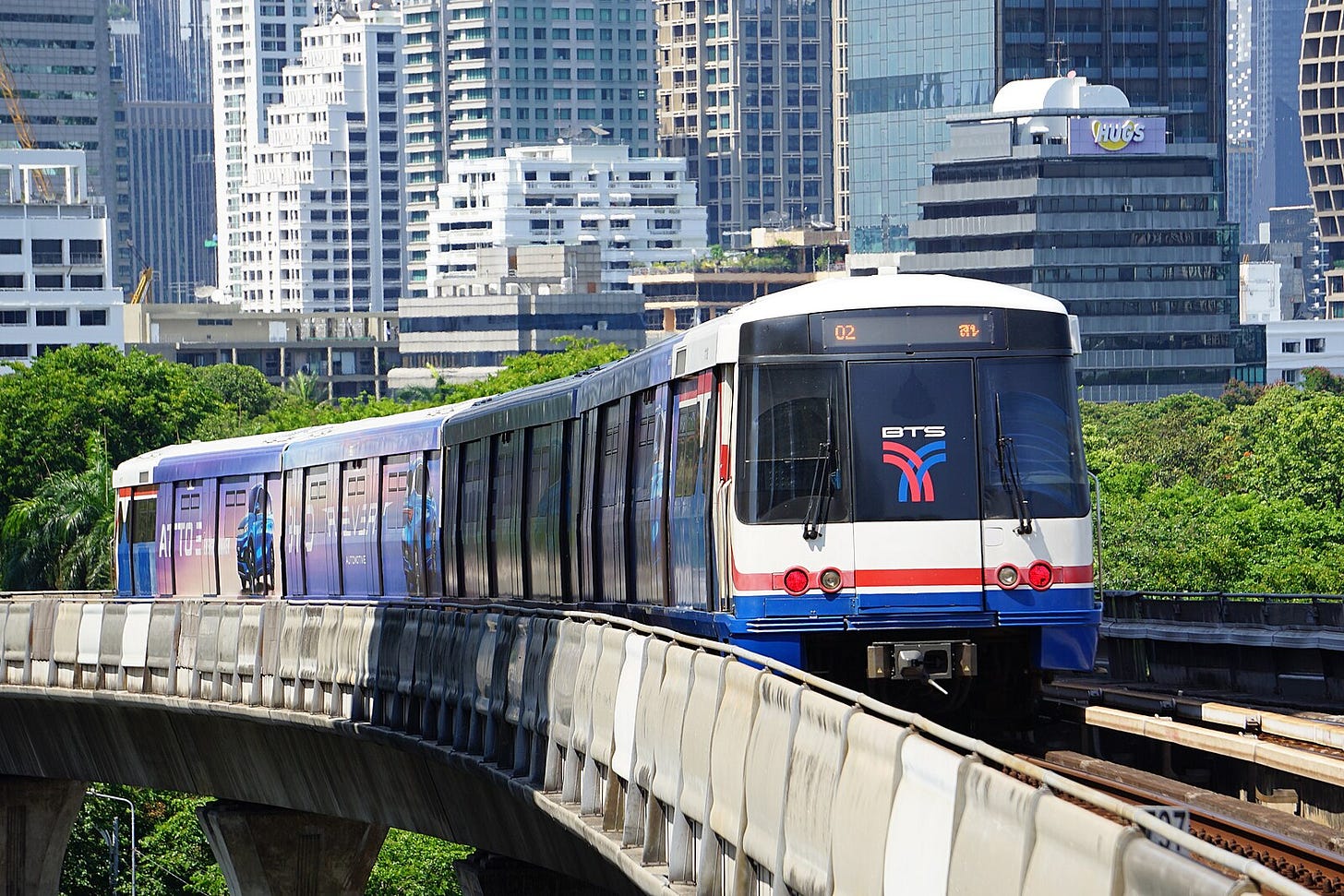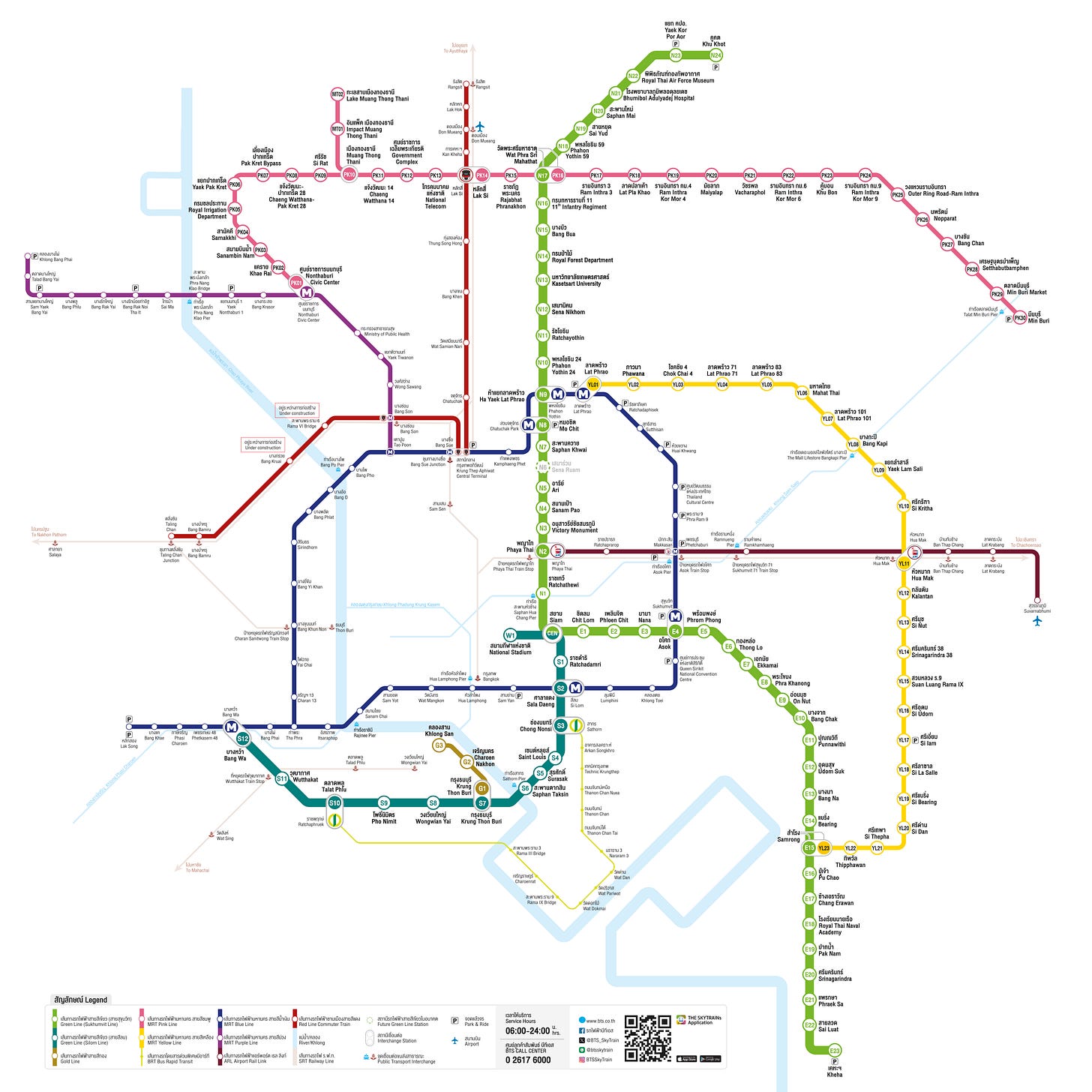Will Twenty Baht Transit Fares Happen?
Pheu Thai's 14-year old policy pledge still faces challenges

I’m very aware that the talk of the town in Thailand currently, as it has been for the past couple of weeks, is on the life-or-death situation that the Pheu Thai government finds itself in. In particular, we are now only a few days away from the Constitutional Court decision on whether or not she will be forced from office due to violations of ethical standards. I don’t have anything to add at this point on her case, aside from noting the obvious: the Prime Minister still has not resigned, and if she does not do so before Friday that telegraphs a certain level of confidence.
We also know that the Shinawatras survived the first of three potential strikes, with Thaksin Shinawatra being cleared of lèse-majesté by the Criminal Court. I don’t think that this result necessarily indicates anything about the other cases, however. Thaksin also isn’t necessarily off the hook, with the Attorney General having not made a decision whether to appeal the court verdict. And of course, we still have to watch for the main court verdict to watch has always been the case on his stay at the Police-General hospital.
As we wait for the Shinawatra legal drama to unfold, I want to change tacks a little bit and discuss a flagship Pheu Thai policy that now appears to be in real trouble: the twenty baht transit fare policy.
Thailand’s transit system has expanded significantly over the past three decades. The Bangkok Mass Transit System, also known colloquially as the BTS Skytrain, first opened in 1999, while the Metropolitan Rapid Transit System (MRT) opened in 2004. In recent years, the coverage of both systems has expanded to cover a vast swathe of Bangkok and its satellite cities. But the fares are not necessarily cheap. Someone traveling from Ha Yaek Lat Phrao to Siam (a total of nine stations) using a regular ticket will pay 62 baht (around $2 USD) to make the trip. The current minimum wage in Bangkok is 400 baht per day (a little over $12 USD).

Pheu Thai’s proposal to reduce these transit fares thus tackles a genuine pain point for Bangkokians. It is not a new proposal: Pheu Thai first campaigned on a 20 baht flat fare on all train rides in Bangkok in 2011, and then-prime minister Yingluck Shinawatra included it in her policy declaration to parliament. Yingluck was not able to see it through, however, and Pheu Thai again campaigned on a 20 baht flat fare in 2023.
It is not difficult to see why this policy faces significant hurdles: it is very expensive. As Dr. Sumet Ongkittikul, Research Director for Transport and Logistics Policy at the Thailand Development Research Institute (TDRI) has said, existing concession agreements between the government and the private rail operators means that 6 to 9 billion baht would be needed annually to compensate the fare revenue. And this would be for a policy that may only increase ridership by around 14 percent.1
The Transport Minister, Suriya Juangroongrueangkit, wants to use the MRT’s 8 billion baht profit to subsidize this cost, but the Ministry of Finance ruled that this would not be legal under the current rules. The government thus decided to submit three bills to parliament to legally clear the way for the 20 baht fare policy. As The Nation summarizes it:
Rail Transport Act amendment: permits government subsidies for electric railway fares…
Mass Rapid Transit Authority (MRTA) Act amendment: allows the MRTA to use its profits to finance fare subsidies.
Common ticket management bill: establishes a clearing house to manage a unified ticketing system and distribute subsidies to concessionaires of electric railway operators.
Currently, the first bill has passed the House of Representatives, while the other two bills have yet to be voted on at all.
Although the new prices were set to take effect on October 1st, with registration to receive 20 baht fare eligibility opened this week (only Thai nationals can buy tickets at this discounted rate), the legislative timeline makes it clear that this would have been a pipe dream. Suriya therefore issued an apology, saying that although he had considered using the central emergency fund to compensate the operators and thus allow the scheme to go ahead, the Office of the Council of State said that this was impermissible because this is not an urgent matter. The new fares have thus been postponed to start in November.
At this point, however, it is worth wondering whether this policy will go the way of its previous incarnation under Yingluck.
Suriya has said that he is confident that the legislation will pass the Senate. I’m not sure that I share his confidence. Is there any incentive for the “dark blue” senators to give Pheu Thai a major policy win right now? I could more easily imagine that this is a great opportunity for the dark blue senators to instead make a show of fiscal discipline and reject the bills. We know that Bhumjaithai figures are on the record as against the policy. As Supachai Jaisamut, a Bhumjaithai politician, said: "The people reducing the fees is not the private operators with the railway concessions but the government, by taking a massive amount of money coming from the taxes of all Thais to compensate these private operators…the responsibility thus falls on all the people to fulfill a campaign policy from a political party.”
The government is probably also under a certain amount of time pressure to get this policy enacted. Paetongtarn’s premiership might yet survive. If not, Chaikasem Nitisiri is still waiting in the wings as the final Pheu Thai candidate for prime minister. But we are now at a point where we cannot rule out stranger things happening in Thai politics, and no one knows if a non-Pheu Thai prime minister will be quite as amenable to this expensive policy.
Yet a second death for this Pheu Thai dream could also snuff out any chance it has of an electoral comeback, especially in Bangkok. Pheu Thai was already on the ropes. In 2023, Pheu Thai was reduced to only one seat in the capital. (That one seat was Theerarat Samrejvanich’s, who won by a margin of four votes out of a total of over 90,000 cast over her Move Forward challenger — so Pheu Thai was extremely lucky to have escaped total extinction in Bangkok).
Having already broken its most significant policy pledge (to give out 10,000 baht to all Thais above the age of 18), and having seen its party brand (perhaps irreparably) damaged over the course of two years of governance, folding the 20 baht fare policy could truly seal the party’s total wipeout in Bangkok. But it’s worth saying at this point that I’m also not sure that this policy on its own would be enough to save the party from electoral disaster anywhere.
At the same time, significantly increasing ridership might also make voters mad in another way. As anyone who has taken the BTS or MRT at rush hour will know, these trains are already impossibly packed.


Nice to know that a two-tier pricing system (Thai/foreigner) is an official government policy.
Ken, I'm a big fan of your writing. I do hope you avoid euphemisms like "dark blue" senators though. Can we just state it plainly?
Is there any incentive for the [BJT-aligned] senators to give Pheu Thai a major policy win right now?